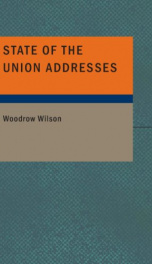Thomas Woodrow Wilson (1856-1924) was the twentyeighth President of the United States. A devout Presbyterian and leading intellectual of the Progressive Era, he served as president of Princeton University then became the reform governor of New Jersey in 1910. With Theodore Roosevelt and William Howard Taft dividing the Republican vote, Wilson was elected President as a Democrat in 1912. He proved highly successful in leading a Democratic Congress to pass major legislation including the Federal Trade Commission, the Clayton Antitrust Act, the Underwood Tariff, the Federal Farm Loan Act and most notably the Federal Reserve System. Wilson's idealistic internationalism, whereby the U. S. enters the world arena to fight for democracy, progressiveness, and liberalism, has been a highly controversial position in American foreign policy, serving as a model for "idealists" to emulate or "realists" to reject for the following century. His works include: When a Man Comes to Himself (1910), The New Freedom (1913), On Being Human (1916), President Wilson's Addresses (1917), State of the Union (1918) and Why We Are at War (1918). --This text refers to an alternate Paperback edition.


















